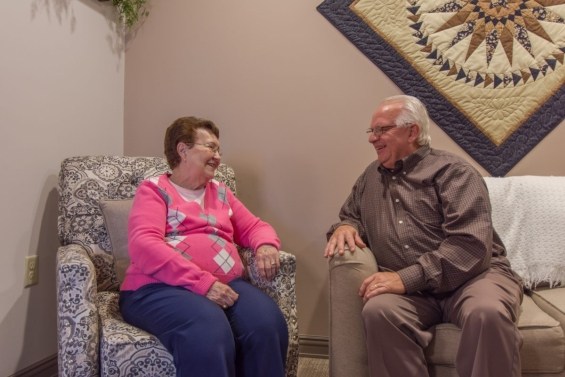Did you know that May is Speech Language Pathology Month? Speech Language Pathology includes voice, fluency, language, and dysphagia (difficulty swallowing). Seniors may have many reasons for speech therapy. Here are a five conditions where speech therapy is used:
- Aphasia: Seniors who suffer strokes can end up with a communication disorder called aphasia. There are degrees and types, but typical characteristics are problems in getting speech to flow or omitting words. Working with these patients individually, speech pathologists help them concentrate and re-learn how to respond to verbal and vocal cues until they reach a functioning level.
- Dementia: The speech pathologist works to help patients retain the ability to communicate as much as possible, keeping a routine that makes them comfortable and avoiding distractions. Communication lessons focus on objects in the immediate environment.
- Dysarthria: Dysarthria is a condition in which the muscles used for speech are either weak or difficult to control. Seniors with Parkinson’s disease or other conditions of the nervous system, are at risk for dysarthria due to the weakness or paralysis caused by their condition. Symptoms include: slurred speech, slow speech, rapid speech, difficulty controlling the volume of one’s voice, or difficulty moving tongue. The speech pathologist observes these patients when they are speaking and resting to monitor muscles and breathing patterns. Some treatment techniques include working on tongue and lip articulation, breathing techniques and speaking more slowly.
- Apraxia: Strokes can also cause apraxia where their mouths can’t seem to articulate what’s in their minds or in the correct order. One treatment technique is to have the patient repeat specific sounds and then gradually form those sounds into words. Getting them to slow down can also help them put sounds together to form words without groping for them and getting upset.
- Dysphagia: As people age, they can experience difficulty swallowing. This is because the elderly often have dental changes, less salivation and are beginning to breathe differently. Strokes or an illness such as pneumonia can also cause dysphagia. The speech pathologist observes how physical structures needed for swallowing are functioning and recommends seating and laying positions, such as tilting the chin up or down. Food modifications and modified eating and drinking utensils may also be recommended by the speech pathologist.
One of the great things about Life Plan Communities, like United Zion, is the number of support programs and services available on campus should you need it. United Zion has robust on-campus therapy department* that includes speech therapy should a resident need those services. Call 717-627-8421 today to learn more about the benefits of becoming a resident at United Zion Retirement Community.
*note: additional fees may apply

